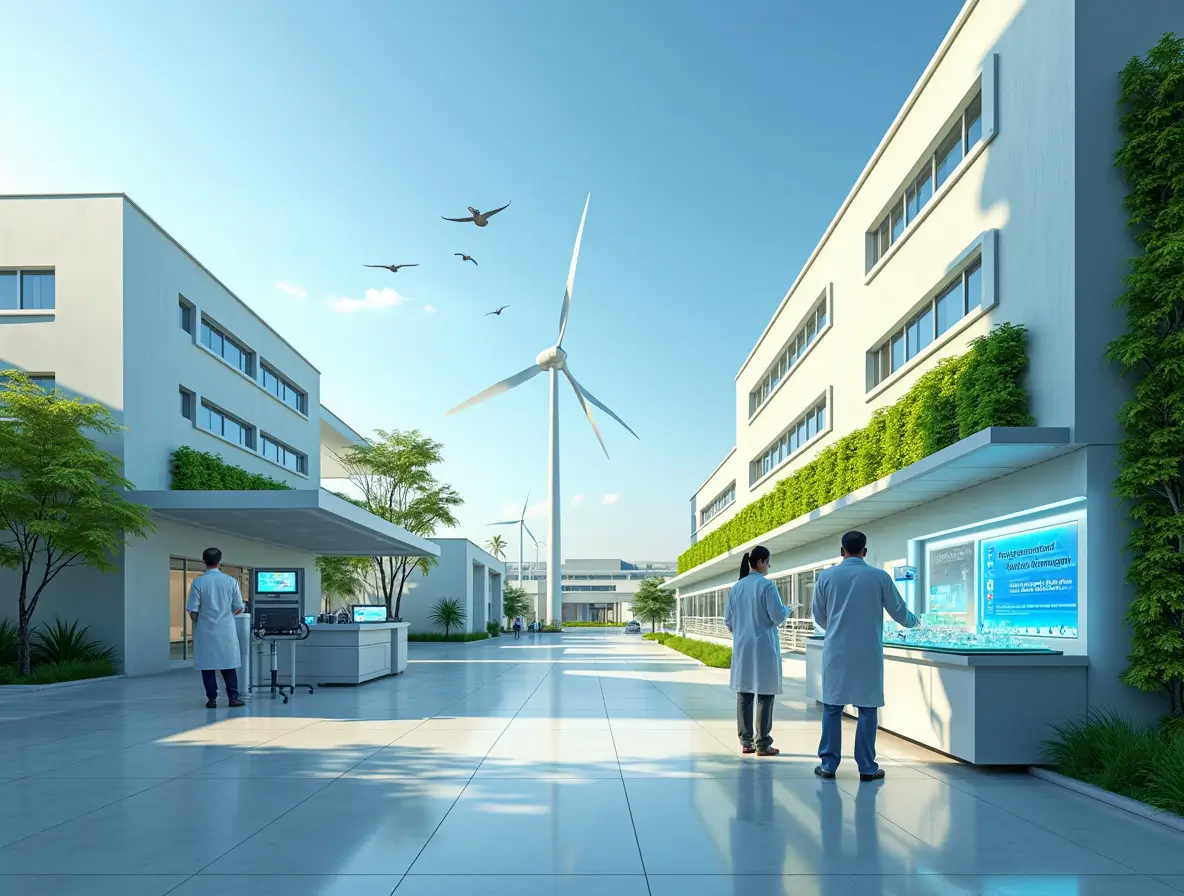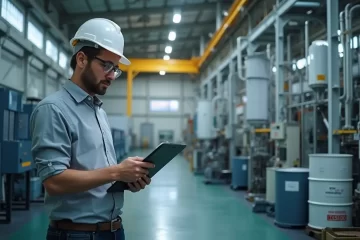Introduction to Rajkot’s Green Initiative
Rajkot has emerged as a pioneering city in sustainable innovation, embracing transformative practices to address global environmental challenges. The city’s focus on green initiatives underscores its commitment to reducing chemical waste and promoting eco-friendly industrial solutions. Local authorities, businesses, and academic institutions collaborate to foster technologies that regenerate chemical solutions, ensuring minimal environmental impact. Efforts include advancing wastewater treatment, repurposing industrial byproducts, and adopting circular economy principles. These initiatives exemplify Rajkot’s proactive stance in achieving long-term sustainability. By integrating renewable resources and cutting-edge methods, Rajkot is setting new benchmarks in the global movement towards eco-conscious chemical processes.
Historical Overview of Chemical Industry in Rajkot
Rajkot has a storied history of industrial development, with its chemical sector emerging as a vital player in regional progress. Early initiatives were centered on small-scale manufacturing of dyes, paints, and basic industrial chemicals, catering to the needs of local businesses. Over time, the industry expanded, driven by technological advancements and evolving market demands. Key milestones include the establishment of state-of-the-art production facilities and the adoption of eco-friendly practices.
The city gained prominence due to its strategic location, offering seamless transport links and access to raw materials. This growth enabled Rajkot to become a hub for chemical innovation, fostering entrepreneurship and regional employment opportunities.
Significance of Eco-Friendly Chemical Solutions
Eco-friendly chemical solutions play a vital role in addressing critical global challenges, including pollution control, resource conservation, and climate change mitigation. By utilizing non-toxic, biodegradable alternatives, such solutions minimize harmful environmental impacts while ensuring industrial efficiency. They address the increasing demand for sustainable practices across sectors such as manufacturing, agriculture, and waste management.
- These solutions enable industries to comply with stringent regulatory standards.
- They contribute to reducing carbon footprints and preserving ecosystems.
- Adoption fosters innovation in green chemistry for cleaner technologies.
Moreover, eco-friendly solutions promote circular economies, focusing on resource regeneration and reuse. Their implementation not only enhances corporate responsibility but also aligns with consumer preferences for ethical production. Such advancements are pivotal to a sustainable future.
Key Drivers Behind Rajkot’s Eco-Innovation Leadership
Rajkot’s prominence in eco-innovation stems from several pivotal factors driving its leadership in regenerated chemical solutions:
- Thriving Industrial Ecosystem: The city is home to an advanced industrial base, facilitating research and experimentation in sustainable practices.
- Governmental Support: Policy incentives and grants from local and national authorities empower businesses to adopt green technologies.
- Focus on R&D: Extensive investment in research institutions pushes innovation in chemical regeneration techniques and energy-efficient production methods.
- Collaborative Networks: Strong partnerships between academia, industry, and technology providers foster knowledge-sharing and scalability.
- Sustainability-Driven Culture: Businesses in Rajkot display a commitment toward environmental responsibility, adopting solutions that minimize resource depletion.
These drivers collectively shape Rajkot into a hub of eco-conscious industrial innovation.
Prominent Companies and Their Contributions
Rajkot has emerged as a hub for innovation in regenerated chemical solutions, with several companies driving growth and advancements in this industry.
- GreenChem Solutions: This firm specializes in waste-to-resource technology by converting industrial by-products into reusable chemicals while maintaining strict environmental standards. Their focus on sustainable practices has positioned them as an industry leader.
- EcoWave Industries: Pioneering in water treatment chemicals, EcoWave Industries manufactures eco-friendly solutions that cater to global wastewater management needs. Their efforts are geared toward reducing water pollution and promoting cleaner ecosystems.
- RenewTech Corp: Known for its cutting-edge research, RenewTech Corp develops bio-based solvents and cleaning agents that are widely adopted in manufacturing processes. Their contributions have significantly enhanced the circular economy model in Rajkot.
These companies exemplify Rajkot’s growing role in driving sustainability through regenerated chemical technologies.
Government Policies and Their Impact on Eco-Friendly Practices
Government initiatives and regulations in Rajkot play a pivotal role in encouraging eco-friendly practices within the regenerated chemical solutions industry. These policies focus on promoting sustainable manufacturing processes, waste management, and resource conservation.
- Subsidies for Green Innovations: Specific grants and financial incentives are allocated to companies implementing technologies that reduce environmental impact.
- Stringent Regulations: Regulations governing chemical disposal ensure safe handling and minimal pollution. These mandates push industries to adopt cleaner methods.
- Public Awareness Campaigns: Government-driven awareness programs educate stakeholders on the importance of environmental sustainability.
- Collaboration with Private Entities: Public-private partnerships foster technological advancements for green chemical regeneration solutions.
Such proactive measures enable Rajkot to serve as a model city for sustainable industrial practices, reinforcing eco-friendly solutions’ social and economic significance.
Research and Development: The Backbone of Innovation
Rajkot stands at the forefront of research and development in regenerated chemical solutions due to its intensive focus on technological advancement and sustainability. By fostering partnerships between academic institutions, industries, and government entities, the city has established a robust ecosystem for innovation. It leverages cutting-edge laboratories and advanced computational facilities to enable breakthroughs in chemical engineering and recycling methods.
Industry leaders in Rajkot emphasize streamlining processes, utilizing eco-friendly materials, and optimizing resource efficiency. Collaboration and knowledge-sharing are strongly prioritized, ensuring continuous improvement. The city’s R&D efforts play a pivotal role in identifying future technologies while addressing global challenges such as waste management and resource depletion.
Collaborative Efforts with Academia and NGOs
Rajkot has emerged as a hub for fostering partnerships between industry leaders, academic institutions, and non-governmental organizations focused on sustainable development. Universities in the region actively engage in research initiatives, offering innovative approaches to chemical regeneration processes. Collaborative projects frequently leverage theoretical insights from academia to address practical challenges in industrial applications. NGOs play a pivotal role by advocating for eco-friendly practices and assisting in community outreach programs that align with chemical sustainability goals. Through shared resources, regular workshops, and joint action plans, stakeholders streamline efforts to advance environmental responsibility and accelerate adoption of regenerated chemical solutions.
Challenges Faced in Implementing Green Chemical Strategies
Implementing green chemical strategies in Rajkot encounters several hurdles that stem from logistical, technological, and economic factors.
- Technological Limitations: Transitioning to sustainable chemical production requires advanced technology, which may not be readily accessible in the region.
- High Initial Costs: Investments in eco-friendly manufacturing processes often pose financial strains for industries, especially small-scale operators.
- Lack of Skilled Workforce: Adopting green practices necessitates specialized training, highlighting workforce limitations in handling such innovations.
- Regulatory Barriers: Fluid and sometimes outdated regulatory frameworks can slow the adoption of novel, sustainable methods.
- Resistance to Change: Established industries exhibit hesitation in abandoning traditional practices for greener alternatives.
Enhanced policies and robust research are essential to overcoming these obstacles effectively.
Success Stories from Rajkot’s Sustainable Chemical Efforts
Rajkot has emerged as a hub for pioneering sustainable chemical solutions, fostering remarkable success stories along the way. Local chemical manufacturers have implemented advanced waste management technologies, reducing environmental impact by nearly 40% in select industries. Key players have embraced renewable energy sources to fuel production facilities, cutting dependency on fossil fuels.
Innovative start-ups in Rajkot have developed biodegradable alternatives to conventional polymers, earning international recognition. Collaborative projects between academia and businesses have yielded effective water treatment solutions, addressing regional water scarcity. These efforts have cultivated global partnerships, with exports of eco-friendly chemicals surging by over 25% last year. Rajkot’s commitment to sustainability continues to inspire transformative change.
Global Recognition and Future Prospects for Rajkot
Rajkot has positioned itself as a pivotal hub in the advancement of regenerated chemical solutions, earning acknowledgment on international platforms. Renowned for its innovative practices, the city attracts attention from global stakeholders, including policymakers, researchers, and investors. Its focus on sustainable chemical technologies aligns with global environmental goals, increasing its appeal across industries.
Future prospects for Rajkot appear promising as it strengthens collaborations with multinational companies. This engagement fosters technological transfers and boosts local capabilities. Moreover, government incentives for green initiatives in Rajkot further enhance its growth potential. With strategic infrastructure expansion underway, Rajkot continues to solidify its role in the worldwide chemical industry transformation.



